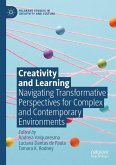In this volume, "culture" refers to sociocultural differences, educational culture, media culture, organizational culture, technological culture, ethnic differences within a culture, and digital culture. Its contributors offer fresh insights on how creativity, innovation, and change can propel us forward and offer hope for the future across these many different forms of culture. They offer both granular studies of creativity and innovation at work inparticular contexts and macro-level discussion on how they affect organizational culture, the culture of a discipline and society at large.
This cross-cultural analysis of creativity, innovation and approaches to change will particularly appeal to practitioners and researchers in the fields of psychology, organizational behavior and education.
David D. Preiss is Professor of Psychology at the Pontificia Universidad Católica de Chile. Professor Preiss is the author of more than 50 papers and chapters in the fields of cultural psychology and educational psychology. He is a fellow of the Association for Psychological Science. He is also the author of five collections of poetry.
Marcos Singer is Professor of Operations Management, Dean of the MBA at the Pontificia Universidad Católica de Chile. Professor Singer is the author of more than 60 papers and chapters in management. He is also a consultant and director of some of the largest companies and institutions in Chile.
James C. Kaufman is Professor of Educational Psychology at the University of Connecticut. He is the author/editor of more than 50 books and 300 papers. Professor Kaufman co-founded two major journals, Psychology of Aesthetics, Creativity, and the Arts and Psychology of Popular Media Culture.
Dieser Download kann aus rechtlichen Gründen nur mit Rechnungsadresse in A, B, BG, CY, CZ, D, DK, EW, E, FIN, F, GR, HR, H, IRL, I, LT, L, LR, M, NL, PL, P, R, S, SLO, SK ausgeliefert werden.









